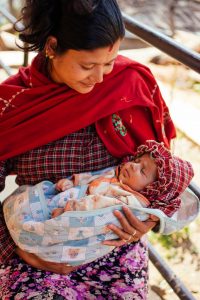
Globally, an estimated 300,000 newborns die from serious infection each year. Approximately 10% of newborn infants develop signs of possible serious bacterial infection (PSBI) and require antibiotics. Most of these deaths could be averted by preventive measures, timely careseeking, treatment with appropriate antibiotics, and follow up.
The greatest burden of neonatal deaths associated with serious infection occurs in South Asia, Sub-Saharan Africa, and Latin America, where there are an estimated 6.9 million cases of PSBI each year. Key studies in South Asia and in Africa indicate that up to two thirds or more of families do not accept referral for hospitalization of a young infant with PSBI.
Where referral is not possible for young infants with PSBI, the World Health Organization (WHO) recommends outpatient treatment by trained health care providers. While this is a recent development in the field of newborn health, the compelling local evidence from many countries demonstrates that simplified, outpatient treatment is a safe, effective, lifesaving alternate intervention when hospitalization is not possible.
This brief provides an overview of the new operational guidelines by WHO and a list of key resources.